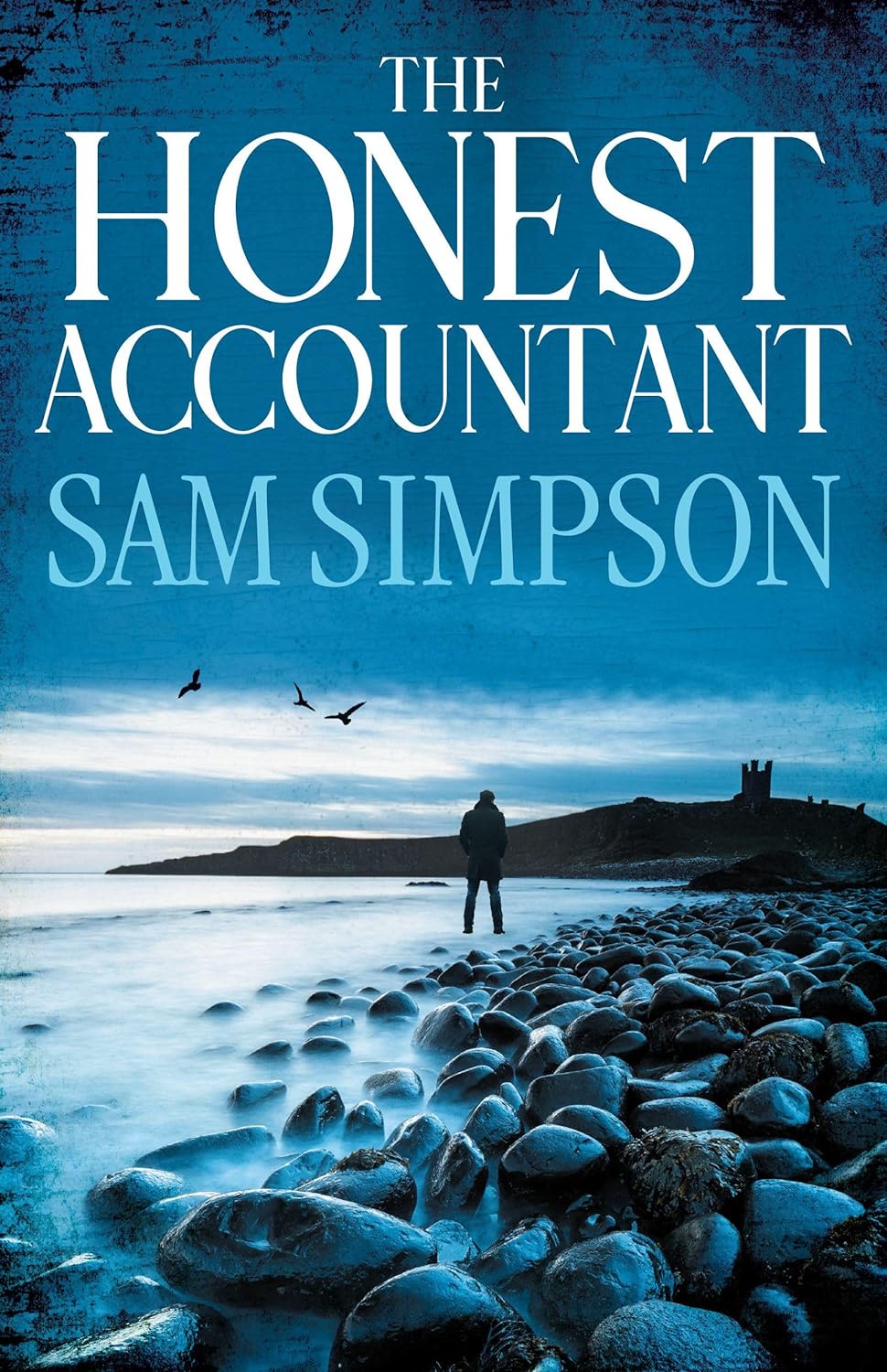THE ACCOUNT
The latest in finance and business

Truth seeker
“April 1997 – John Major’s government is dying. Tom Mackay, Scottish accountant and part-time Tory canvasser, is working in City audit when he stumbles across a large insurance fraud. Evidence suggests his boss Silas Craven, who is standing in the election, could be linked to the missing money and some suspicious deaths – but Mackay’s not sure.”
This is the set-up for The Honest Accountant, a novel from Sam Simpson. Before pursuing his passion for writing, Simpson was an accountant who had spells working in Whitehall and for the Bank of England.
With impeccable timing, the book is set during the 1997 general election, and we all know how that turned out. It introduces Tom Mackay and Sally Purcell, a pair of accountants who team up with journalist Nick Steadman to investigate a large insurance fraud.
The search starts in London and leads them to Gibraltar and Northumberland. The Honest Accountant was originally published in 2006 under the pseudonym Peter Milwain, though it has now been reissued under Simpson’s own name, along with two sequels.
In real life, Simpson’s son is following in his father’s footsteps and is going down the ICAS route to become a CA. The Honest Accountant can be purchased on Amazon.
Truth seeker
“April 1997 – John Major’s government is dying. Tom Mackay, Scottish accountant and part-time Tory canvasser, is working in City audit when he stumbles across a large insurance fraud. Evidence suggests his boss Silas Craven, who is standing in the election, could be linked to the missing money and some suspicious deaths – but Mackay’s not sure.”
This is the set-up for The Honest Accountant, a novel from Sam Simpson. Before pursuing his passion for writing, Simpson was an accountant who had spells working in Whitehall and for the Bank of England.
With impeccable timing, the book is set during the 1997 general election, and we all know how that turned out. It introduces Tom Mackay and Sally Purcell, a pair of accountants who team up with journalist Nick Steadman to investigate a large insurance fraud.
The search starts in London and leads them to Gibraltar and Northumberland. The Honest Accountant was originally published in 2006 under the pseudonym Peter Milwain, though it has now been reissued under Simpson’s own name, along with two sequels.
In real life, Simpson’s son is following in his father’s footsteps and is going down the ICAS route to become a CA. The Honest Accountant can be purchased on Amazon.
CAs in the news
Brian Duffy CA
Watches of Switzerland CEO, Brian Duffy CA, has just overseen its takeover of Italian jeweller Roberto Coin, whose US sales make it the sixth-largest in the country. “It will allow us to take one of the fastest-growing jewellery brands in the US and use our retail and operational expertise to accelerate growth and further elevate the Roberto Coin proposition,” said Duffy.
Michaela Kyriacou CA
Since opening five years ago, north London coffee shop Bean + Brew, owned and run by Michaela Kyriacou CA, has had to contend with lockdown, Brexit and soaring costs. Yet Kyriacou has managed to navigate all those challenges. And to celebrate the coffee bar’s fifth birthday, she donated all profits from that day to a food bank in nearby Bounds Green.
Chris Miller CA
White Rabbit Projects owns a group of restaurants across London, including Lina Stores, Kricket and Soma. CEO Chris Miller CA is now looking to expand the company’s interests into Portugal. In an interview with MCA, Miller said: “You can still make a lot of money in the UK, but the market has evolved significantly. Value for money is much more important.”
Going green
A joint report recently highlighted the growing importance of sustainability when it comes to mergers and acquisitions (M&A).
"Sustainability risks and opportunities are now front and centre in M&A," says Simon Grant FCA, Group Executive Advocacy and International Development, in the report from Chartered Accountants Australia and New Zealand and the Association of Chartered Certified Accountants. Grant adds: “Finance and accounting professionals must adeptly navigate this landscape to not only mitigate risks but also uncover new avenues for value creation.”
Three of the key conclusions from the report, which can be read in full here, are as follows…
• Sustainability-related opportunities and risks cannot be ignored in a transaction: they now form a fundamental part of the strategic intent of the transaction and the valuation of an entity.
• The assessment of these risks and opportunities must be comprehensively considered as part of the due diligence process, both as a specific workflow and as an integral part of other forms of due diligence.
• Organisations need to ensure that they have an appropriate level of expertise across the transaction workflow and in relation to the target’s operations, assets and liabilities.

Going green
A joint report recently highlighted the growing importance of sustainability when it comes to mergers and acquisitions (M&A).
"Sustainability risks and opportunities are now front and centre in M&A," says Simon Grant FCA, Group Executive Advocacy and International Development, in the report from Chartered Accountants Australia and New Zealand and the Association of Chartered Certified Accountants. Grant adds: “Finance and accounting professionals must adeptly navigate this landscape to not only mitigate risks but also uncover new avenues for value creation.”
Three of the key conclusions from the report, which can be read in full here, are as follows…
• Sustainability-related opportunities and risks cannot be ignored in a transaction: they now form a fundamental part of the strategic intent of the transaction and the valuation of an entity.
• The assessment of these risks and opportunities must be comprehensively considered as part of the due diligence process, both as a specific workflow and as an integral part of other forms of due diligence.
• Organisations need to ensure that they have an appropriate level of expertise across the transaction workflow and in relation to the target’s operations, assets and liabilities.

Xero sum gamechanger
Hair salons, nail bars, penalty shoot-outs... these were just some of the attractions at this year’s Xerocon, an accounting conference quite unlike any other.
We were too busy to get our nails done for the event, held at London’s ExCeL in June, and listened to a host of speeches which put the spotlight on how AI is changing the profession.
And we also got to try out a raft of new product launches from Xero, including the unveiling of its new partnership tax solution, available from this month in beta. This will enable accountants and bookkeepers to automatically prepare partnership annual accounts and tax using Xero data and seamlessly file tax returns with HMRC. According to Xero, adding partnership tax returns means it can handle the vast majority of compliance tasks needed to serve UK small businesses in one place.
The accounting software giant also launched a new payroll manager in beta, designed to help “advisers manage payroll data easily from a centralised dashboard”.
Diya Jolly, Chief Product and Technology Officer at Xero, said: "We’re always listening to our customers and partners about the tools and workflows that are most important to them.
“Expanding our tools to include features like partnership tax and the new payroll manager will equip advisers to better support their clients with critical small business needs and move towards a more streamlined practice management experience.”

Xero sum gamechanger
Hair salons, nail bars, penalty shoot-outs... these were just some of the attractions at this year’s Xerocon, an accounting conference quite unlike any other.
We were too busy to get our nails done for the event, held at London’s ExCeL in June, and listened to a host of speeches which put the spotlight on how AI is changing the profession.
And we also got to try out a raft of new product launches from Xero, including the unveiling of its new partnership tax solution, available from this month in beta. This will enable accountants and bookkeepers to automatically prepare partnership annual accounts and tax using Xero data and seamlessly file tax returns with HMRC. According to Xero, adding partnership tax returns means it can handle the vast majority of compliance tasks needed to serve UK small businesses in one place.
The accounting software giant also launched a new payroll manager in beta, designed to help “advisers manage payroll data easily from a centralised dashboard”.
Diya Jolly, Chief Product and Technology Officer at Xero, said: "We’re always listening to our customers and partners about the tools and workflows that are most important to them.
“Expanding our tools to include features like partnership tax and the new payroll manager will equip advisers to better support their clients with critical small business needs and move towards a more streamlined practice management experience.”

Don’t believe the hype
Imagine Xero, Sage or a similar company launched some new accounting software with all sorts of promises about how it would improve your processes and productivity. Eager to stay abreast of technology, you dutifully buy it. But it turns out to be little more than a work in progress, with some applications missing and others not fully functioning. You would, understandably, feel cheated.
Yet this is exactly what is happening across a raft of major tech-related launches. Take the Rabbit R1, for example. It’s a gadget that can’t do much more than any smartphone virtual assistant. Influencer and web producer Marques Brownlee, aka MKBHD, described it as “barely reviewable” because it failed to deliver on even the most basic of promises. The Verge called it “underwhelming, unpredictable and often wrong and entirely pointless”.
Yet Rabbit R1 shifted some 100,000 units on pre-order at $200 (£160) a go. This was largely because its founder talked a great game and made questionable claims about its AI capabilities – AI, of course, being the marketing tool of the hour – although makers insist the product will improve with each new update.
Then, of course, there’s Tesla’s Cybertruck. The list of things it was meant to do, but doesn’t, is simply too long to recount here. This, of course, is far from the first time Elon Musk has promised more than he’s been able to deliver, as anyone waiting for the “full self-driving” Tesla – originally due in 2017, and almost every year since – will know.
We have also seen a raft of AAA video games sold at a premium price but without all the advertised features. It’s as if tech entrepreneurs have adopted the Apple approach of releasing the product first, then adding new features or bug fixes as they go. But it seems some think that gives them licence to sell a fundamentally bad product on the back of misleading claims.
So who is to blame for this? Well, you could say Musk is the master of hype. But the original culprit also happens to be the world’s most famous and prolific inventor, Thomas A Edison. In many ways, Edison provided a blueprint for the “fake it till you make it” ethos. For example, he claimed to have invented the electric lightbulb four years before he actually cracked the formula.
A case of plus ça change? Perhaps. But Edison didn’t have to contend with an army of “very online” critics and YouTubers scrutinising his every move and sending scornful reviews around the world. Perhaps the day will soon dawn when the tech world leaves the faking behind and ploughs all its undoubted ingenuity into making it right first time.
RYAN HERMAN
Don’t believe the hype
Imagine Xero, Sage or a similar company launched some new accounting software with all sorts of promises about how it would improve your processes and productivity. Eager to stay abreast of technology, you dutifully buy it. But it turns out to be little more than a work in progress, with some applications missing and others not fully functioning. You would, understandably, feel cheated.
Yet this is exactly what is happening across a raft of major tech-related launches. Take the Rabbit R1, for example. It’s a gadget that can’t do much more than any smartphone virtual assistant. Influencer and web producer Marques Brownlee, aka MKBHD, described it as “barely reviewable” because it failed to deliver on even the most basic of promises. The Verge called it “underwhelming, unpredictable and often wrong and entirely pointless”.
Yet Rabbit R1 shifted some 100,000 units on pre-order at $200 (£160) a go. This was largely because its founder talked a great game and made questionable claims about its AI capabilities – AI, of course, being the marketing tool of the hour – although makers insist the product will improve with each new update.
Then, of course, there’s Tesla’s Cybertruck. The list of things it was meant to do, but doesn’t, is simply too long to recount here. This, of course, is far from the first time Elon Musk has promised more than he’s been able to deliver, as anyone waiting for the “full self-driving” Tesla – originally due in 2017, and almost every year since – will know.
We have also seen a raft of AAA video games sold at a premium price but without all the advertised features. It’s as if tech entrepreneurs have adopted the Apple approach of releasing the product first, then adding new features or bug fixes as they go. But it seems some think that gives them licence to sell a fundamentally bad product on the back of misleading claims.
So who is to blame for this? Well, you could say Musk is the master of hype. But the original culprit also happens to be the world’s most famous and prolific inventor, Thomas A Edison. In many ways, Edison provided a blueprint for the “fake it till you make it” ethos. For example, he claimed to have invented the electric lightbulb four years before he actually cracked the formula.
A case of plus ça change? Perhaps. But Edison didn’t have to contend with an army of “very online” critics and YouTubers scrutinising his every move and sending scornful reviews around the world. Perhaps the day will soon dawn when the tech world leaves the faking behind and ploughs all its undoubted ingenuity into making it right first time.
RYAN HERMAN












